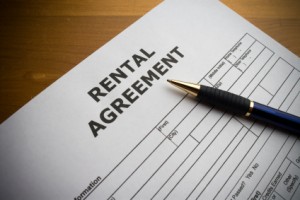Posted by Teresa on August 5, 2013 under Lease and Rental Agreements, Legal | 
 Where do you obtain your leases and other legal documents? Many landlords and property managers download them from the Internet, which is fine—but it’s always best to have a lawyer who is versed in landlord-tenant law look it over before you sign on the dotted line.
Where do you obtain your leases and other legal documents? Many landlords and property managers download them from the Internet, which is fine—but it’s always best to have a lawyer who is versed in landlord-tenant law look it over before you sign on the dotted line.
If you don’t have a lease prepared or approved by a legal professional, you could be setting yourself up for trouble without even realizing it. How? By either not understanding the terms of your lease, or by using one that is not applicable in your state.
We learned recently of a new landlord whose lease terminology bit her in the foot. While she thought that she made it clear that pet deposits were non-refundable, she actually states in the lease that the entire amount she was charging ($500) was completely refundable! Here is the language she used:
“Tenant shall pay to Landlord a pet deposit of five hundred dollars, zero dollars of which shall be non-refundable.”
If zero dollars are non-refundable, then the rest must be refundable, right? In addition, the lease stated that the pet deposit would be used for the purpose of cleaning the carpet. A tenant could argue that if the carpets did not need cleaning upon the termination of the lease, the landlord was not entitled to the funds. There were no other possible uses stated, so the landlord could not use the deposit to repair carpet or flooring, replace moldings, or fix any other items a dog or cat might have damaged.
Unfortunately, the landlord did not realize her mistakes until a tenant with a dog moved out and demanded the entire pet deposit returned. The tenant understood that the entire deposit was, indeed, refundable according to the lease they both signed.
The lesson here is to not only understand the terms of your own lease, but to write the lease in plain English. If you want to charge a non-refundable pet deposit, then say so. Don’t add in conditions or uses for the deposit, such as cleaning carpets.
And finally, seek expert advice on lease questions and other legal matters. It’s worth it in the long run!
Posted by Teresa on July 18, 2013 under Screening and Background Checks, Tenant Screening & Background Checks | 
 Out of any 10 lease applications, how many contain lies, omissions or truth-stretching? Unfortunately, many will. That’s why landlords and property managers can’t assume every applicant fills out an application truthfully. If you’re lucky, the majority will be hard-working, honest people who are simply looking for a great place to live. But can you count on every applicant to tell the truth? And how can you tell if they’re not?
Out of any 10 lease applications, how many contain lies, omissions or truth-stretching? Unfortunately, many will. That’s why landlords and property managers can’t assume every applicant fills out an application truthfully. If you’re lucky, the majority will be hard-working, honest people who are simply looking for a great place to live. But can you count on every applicant to tell the truth? And how can you tell if they’re not?
Verify, verify, verify! It’s up to you to do the digging and reveal the truth.
The best way is to do that is through a thorough background check, which can reveal the following information:
- Whether the applicant has ever used another name.
- If the Social Security Number listed is valid.
- Whether the applicant has declared bankruptcy, and when and where it was filed.
- Any liens or judgments against the applicant.
- Whether the previous addresses listed are accurate.
- Any addresses the applicant omitted.
- Whether the applicant is listed as a registered sex offender.
- Any flags on any of the addresses listed by the applicant.
What’s more, a background check can also tell you whether you can be confident in accepting the applicant’s check.
Of course, you’ll need to do some verification on your own, including contacting and talking to the applicant’s previous landlords and current employer. Be sure to verify that you’re actually talking to the property owner and a representative of the employer. Look up names and phone numbers online, and compare them to what the applicant provided.
Posted by Teresa on under Landlord Tips, Lease and Rental Agreements | 
 In Washington and Colorado, voters decided last year that marijuana should no longer be illegal for recreational use. Both states are hammering out rules, regulations and policies to cover this new freedom. But landlords can be stuck in the middle, since pot is still illegal under federal law. Many have added simply added marijuana smoking to their overall smoking bans to keep things simple.
In Washington and Colorado, voters decided last year that marijuana should no longer be illegal for recreational use. Both states are hammering out rules, regulations and policies to cover this new freedom. But landlords can be stuck in the middle, since pot is still illegal under federal law. Many have added simply added marijuana smoking to their overall smoking bans to keep things simple.
But if you don’t live or own rental property in either Washington or Colorado, marijuana is still illegal. And as a landlord, you don’t have to put up with any illegal drug use on your property.
The best way to prevent it is to implement and enforce a zero tolerance drug policy—and to make sure that every applicant and tenant is aware of it. Put it on the lease application and of course, in the lease itself.
Landlords can be at great risk when tenants break the law by using their property for illicit purposes—even if they are completely unaware of it. Hands-on management and close-up monitoring with routine inspections can help you avoid this problem. Of course, you’ll need to give tenants ample notice that you plan to enter the unit, and you certainly can’t snoop through their drawers and closets. So how can you tell if illegal drugs are around?
Many landlords will tell you that their tenants aren’t all that careful when it comes to hiding their drug paraphernalia. Or, you might just catch the odor of marijuana wafting out an open window or through a vent when you’re walking around your property. Keep your ears and the lines of communication open, and you might have other tenants tell you that they’ve seen signs that could indicate drug activity.
When you suspect tenants are using, buying or selling drugs in your rental property, it’s in your best interest to deal with it. If your lease contains a clause that tenants agree to not violate laws, including possession, use, manufacture or sale of illegal drugs, then he or she is violating the lease agreement. Your next move should be to follow your states laws and initiate eviction proceedings.
Evicting over marijuana smoking might seem like evicting over beer drinking, but as long as it’s illegal, you could be open to litigation. It also sends a signal to all tenants that you will always enforce the terms of your lease, 100%. Otherwise, the risk is just too great.
Posted by Teresa on July 12, 2013 under Eviction, Fair Housing Act, FCRA Issues | 
 Here’s a handy list of terms landlords should be familiar with.
Here’s a handy list of terms landlords should be familiar with.
Abandonment: When a tenant defaults in the payment of rent and indicates by words or actions that they have vacated the premise.
Americans With Disabilities Act: A law passed by Congress in 1990 requiring any business or public facility to be accessible to everyone, including those with disabilities.
Arbitration: Using a neutral third party to resolve a dispute instead of going to court.
Certified Mail: A written verification from the Postal Service that the letter you mailed was delivered to its address. It requires a signature.
Common Area: Areas generally accessible to all residents or users, such as hallways, stairways, laundry rooms, recreational rooms and playgrounds.
Co-Signer: A person or persons in addition to the tenant, who agree to be responsible to pay rent and uphold conditions of the lease.
Consumer Report: A detailed report that provides personally identifiable information relating to one’s credit, character or lifestyle. The FCRA only covers reports prepared by a consumer reporting agency.
Consumer Reporting Agency: An entity that collects and disseminates information about consumers to be used for credit evaluation.
Credit Report: A report prepared by a credit reporting service that describes a person’s credit history for the last seven years.
Credit Score: A numerical value or a categorization derived from a statistical tool or modeling system used by a person who makes or arranges a loan to predict the likelihood of certain credit behaviors, including default.
Default: a tenant’s failure to do something that the law requires.
Default Judgment: A judgment issued by the court, without a hearing, when the tenant has failed to file a response to the landlord’s complaint.
Discrimination: Denying a person housing or stating that housing is not available because of a person’s race, color, religion, sex, sexual orientation, national origin, ancestry, age, disability, marital or familial status. Treating people differently could also be considered discrimination.
Equal Housing Opportunity: Laws that prohibit discrimination in housing on the basis of race, color, religion, sex, national origin, age, disability or familial status.
Eviction: A court proceeding for removing a tenant from a rental unit because the tenant violated the rental agreement or did not comply with a notice ending the tenancy.
Fair Credit Reporting Act: The Fair Credit Reporting Act (FCRA), as amended September 30, 1997, regulates consumer credit information gathering and dissemination. It dictates seven and ten year limits on how long negative information can be reported. The Act also provides a method for correcting erroneous information in a credit file. The 1997 amendment covers landlord tenant relationships and requires landlords to notify tenants if they have been rejected because of information in their credit file or references from previous landlords.
Fair Housing Act: The Fair Housing Act, as amended in 1988, prohibits discrimination in housing based on race, color, religion, national origin, sex, physical or mental handicap, or living with children, expect that housing for older persons may exclude children.
Fees: Money collected from tenants that will not be returned at the end of the tenancy, such as for applicant screening, cleaning, pets, etc.
Guest: a person who does not have the rights of a tenant but stays in/on the premises for a set period.
Inspection Checklist: A written checklist or statement specifically describing the condition and cleanliness of or existing damages to the premises and furnishings, such as walls, floors, countertops, carpets, drapes, furniture and appliances. The statement should be signed by both the landlord and the tenant.
Lead-based Paint Disclosure: A document that must be provided to all tenants before they enter into a rental agreement on properties built before 1978.
Lease: A written or oral contract between a landlord and a tenant that transfers the right to exclusive possession and the use of the landlord’s real property to the tenant for a specified period of time and for a stated consideration (rent).
Lessee: The tenant.
Lessor: The landlord.
Market Rent: The prevailing monthly rent for comparable units in a specific area.
Mediation: A way to resolve disputes by sitting down with an impartial person to reach a voluntary settlement. Medication involves no formal court procedures, and the mediator does not have the power to render a binding decision or force an agreement on the parties.
Month-to-Month: When premises are rented for an indefinite time, with monthly or other periodic rent reserved; or from period to period on which rent is payable and shall be terminated by written notice in accordance with the lease and law.
Normal Wear and Tear: Deterioration which occurs as a results of intended use, without negligence, carelessness, accident, misuse or abuse.
Rental Criteria: A set of criteria than an applicant must meet in order to qualify for tenancy. Landlords should apply criterion consistently and fairly from applicant to applicant to avoid Fair Housing issues.
Renter’s Insurance: Insurance protecting the tenant against property losses, and liability for claims or lawsuits filed by the landlord or others alleging that the tenant negligently injured another person or property.
Security Deposit: Monies paid to the landlord by a tenant as a deposit or security for performance of the tenant’s obligations in a lease or rental agreement. Each state enforces laws that must be followed if a landlord accepts a security deposit.
Sublet: An agreement between the original tenant and a new tenant by which the new tenant takes over the lease of a rental unit. Both the original tenant and the new tenant are still responsible to the landlord
Ten Day Notice to Comply with the Rental Agreement or Vacate: A form used when a tenant breaches the lease or rental agreement in ways other than failing to pay rent.
Three Day Notice to Pay Rent or Vacate: In most state, if a tenant defaults in payment of rent, this notice needs to be served to the tenant to begin eviction proceedings.
Tenant Screening: A process used primarily by landlords and property managers to evaluate prospective tenants to assess the likelihood the tenant will fulfill the terms of the lease or rental agreement. The process culminates in a decision as to whether to approve the applicant, approve the applicant conditionally (such as requiring an increased deposit or cosigner) or deny tenancy.
Start your tenant relationship off right by knowing who you’re leasing to. Protect your rental property and assets with tenant background checks. Proper tenant screening will ensure you are leasing to the best possible tenants.
Posted by Teresa on June 19, 2013 under Landlord Tips, Tenant Credit Checks | 
 Have you been thinking about becoming a landlord? Do you think you have what it takes to be a successful one? Despite the rise in home prices over the past couple of years, it could still be a great time to purchase investment property in your neck of the woods. Mortgage rates remain at historic lows, and some bargains are still out there.
Have you been thinking about becoming a landlord? Do you think you have what it takes to be a successful one? Despite the rise in home prices over the past couple of years, it could still be a great time to purchase investment property in your neck of the woods. Mortgage rates remain at historic lows, and some bargains are still out there.
New landlords are typically new investors, but the club also includes folks who’ve had a hard time selling their homes, who are turning to renting to keep the mortgage paid. And while there are plenty of resources out there for newbies, the advice of seasoned landlords can be priceless.
Here’s a compilation of what it takes to be a successful landlord, as provided by our clients over the years:
Business acumen: Treating the landlording business like a hobby is a mistake. It’s a business, in which you are trying to make money. Never forget that. Be professional. Keep excellent records. Maintain procedures and follow them. Pay for professional tax and legal advice.
Toughness: You’ll have to enforce your rules in every situation, with every tenant or prospective tenant. At times, tenants will appeal to your softer side, asking for leniency, extensions on the rent or other favors. And you’ll have to be tough.
Patience: On the other hand, you’ll be dealing with people, not numbers. Being patient (and even kind) while enforcing your rules will go a long way to establishing a good rapport with your tenants. You’ll also need patience when your phone rings at 2 a.m., when a tenant stops up the sink for the fourth time and when your landscaping crew cuts back the wrong tree.
Outgoing personality: You don’t need to be s total extrovert or comedian to be a successful landlord. But you should be good at dealing with people, able to confront or engage them as the situation warrants, and ready to smile—even when you don’t feel like it. Remember, your tenants are your customers. A pleasant demeanor will go a long way.
Consistency: Some landlords apply the rules according to the tenant or prospective tenant. For example, Tenant A’s kids are allowed to have huge float toys in the pool because you like them better than Tenant B’s kids. Or, the nicely dressed white female prospective tenant does not have to undergo a tenant credit check, but the casually dressed minority male applicant does. The first scenario could make for upset tenants; the second could have you accused of discrimination. Be consistent with all of your rules, in every situation, for every tenant.
The ability to say “no”: You have certain obligations to your tenants, including safe housing, heat, water, trash pickup and functioning plumbing. Depending on the terms of the lease, you may also be obligated to provide Internet, cable TV, air conditioning or a clean swimming pool.
You are not obligated to provide housing to people who don’t meet your minimum requirements for credit history, income or employment. You’re not obligated to allow a tenant to rescue a kitten if you’ve a no-pets policy. And, you’re under no obligation to finance your tenants’ housing. You provide the housing, and they pay you. On time. You’re within your rights to say “no” to any and all other requests—and if you have a hard time saying “no,” you might not be cut out for the landlording business.
Posted by Teresa on June 14, 2013 under Fair Housing Act, Landlord and Tenant FAQs | 
 Between the Fair Housing Act and the Americans With Disabilities Act, it’s clear that landlords must accommodate tenants with disabilities. If your rental property is of a certain size and age, it’s probably already built to accommodate wheelchairs. And if a unit is to be leased by a person with disabilities, you must allow them to make reasonable modifications to accommodate their needs. And of course, if a tenant requires a service animal, you must allow it, even if you have a “no pets” policy. You’re entitled to ask for documentation from your tenant’s healthcare provider outlining the need for the service animal.
Between the Fair Housing Act and the Americans With Disabilities Act, it’s clear that landlords must accommodate tenants with disabilities. If your rental property is of a certain size and age, it’s probably already built to accommodate wheelchairs. And if a unit is to be leased by a person with disabilities, you must allow them to make reasonable modifications to accommodate their needs. And of course, if a tenant requires a service animal, you must allow it, even if you have a “no pets” policy. You’re entitled to ask for documentation from your tenant’s healthcare provider outlining the need for the service animal.
But what about your tenants’ guests? One landlord experienced this situation recently. A tenant had a long-term visitor who brought his dog along. When reminded of the no-pets rule, the tenant stated the dog was a service animal.
In this case, is the landlord obligated to accommodate the guest’s animal? And is the landlord allowed to request documentation?
The answer to both questions is “yes.” Under the Fair Housing Act, persons who are associated with tenants are a protected class if they have a disability. If that disability is not obvious, the landlord may request verifying information. Note, however, that a landlord may not ask that the verification letter include a description of the disability.
So there you have it. You may certainly ask a tenant why their guest has an animal and if it is a service animal, ask for verification. Otherwise, you could have angry tenants who wonder why you’re making an exception to the no-pets rule.
Posted by Teresa on May 23, 2013 under Landlord and Tenant FAQs, Landlord Paperwork and Forms, Rents and Deposits | 
 One of the biggest issues landlords and tenants seem to have is the handling of the security deposit. Smart landlords require them—and all landlords should. Here are some basic points about security deposits you should know and be ready to share with your tenants whenever questions arise.
One of the biggest issues landlords and tenants seem to have is the handling of the security deposit. Smart landlords require them—and all landlords should. Here are some basic points about security deposits you should know and be ready to share with your tenants whenever questions arise.
The security deposit is:
- Money collected up front to compensate for damages. At the termination of the lease, any repairs, cleaning fees or other expenses incurred to take care of damages outside ordinary wear and tear will be taken out of the tenant’s prepaid security deposit.
- Money collected up front to compensate for failure to pay rent, fees and late charges. In case a tenant fails to pay rent, fees or late charges, the landlord may get compensation from the security deposit.
- The best way to prevent financial squabbles between landlords and tenants. Once the tenant has moved out, it’s nearly impossible to chase him or her down to collect for lost rent or damages.
The security deposit is not:
- The last month’s rent. You should not allow a tenant’s security deposit to be used as the last month’s rent. They are two separate categories. Tell all tenants that they need to pay their last month’s rent, and after they are all moved out, you will conduct an inspection and walk-through to determine whether there are any damages to the property, and how much, if any, of their security deposit they will receive back.
- A savings account. Some states, such as California, require landlords to pay interest on security deposits held for at least a year, but most do not. California landlords may elect to hold the security deposit in an interest-bearing account or pay the interest established by a state commission. However, most states do not have the interest-paying requirement, and therefore, landlords may return all, a portion of or none of the security deposit to the tenant without any additional interest. Check your local and state laws.
- The landlord’s money. It is your tenant’s money, which you are holding as a small insurance policy against the possibility of loss due to damages or unpaid rent, fees or late charges. Smart landlords deposit tenants’ security deposits into separate accounts which they do not use for business expenses.
By the Way: It’s not up to the tenant to determine whether he or she has caused any damage. Checklists and photos of the rental unit on move-in day and move-out day are a great way to document any needed cleaning or repairs.
Posted by Teresa on May 17, 2013 under Fair Housing Act, Landlord Tips, Tenant Screening & Background Checks | 
 Being a landlord isn’t easy. It’s a challenging way to make a living or earn extra money. However, investing in real estate and leasing property can be quite rewarding when done right. Avoiding these common landlord errors can keep you out of legal trouble, and make things a little easier.
Being a landlord isn’t easy. It’s a challenging way to make a living or earn extra money. However, investing in real estate and leasing property can be quite rewarding when done right. Avoiding these common landlord errors can keep you out of legal trouble, and make things a little easier.
Using the same old lease, or someone else’s lease: Landlords who’ve been leasing properties for a long time often use the same lease for decades. And those who are new at it, often download a lease agreement off the Internet, or borrow one from a friend. It’s true that most leases contain common language, but it’s best to have yours customized for your property, your circumstances and your preferences. It could be well worth it to sit down with a landlord-tenant lawyer and have your lease reviewed.
Forgetting that time equals money: You might not mind doing repairs, cutting the grass or performing maintenance at your rental properties. If you’re an expert at these things, it could be cost-effective to do it yourself. However, if your work is sub-par, it takes longer than it should or requires follow-up repairs, you are probably wasting your time—and losing money. Hire experts to do the things you can’t do, and focus on what you do well. Fill empty units, update your website or take classes to make yourself a better businessperson.
Breaking anti-discrimination laws: You cannot refuse to rent to a prospective tenant based on race, national origin, religion, familial status, color, gender or disability. Landlords are not allowed to ask prospective tenants questions that refer to these things, either.
Basing acceptance of a tenant on anything other than cold, hard facts: Look at an applicant’s previous rental history, current and former employment, income, and credit worthiness. Run a background check to weed out those with criminal records. But don’t make decisions based on how a tenant applicant looks or dresses, or the car he or she drives.
Failing to follow the same procedures with every applicant: You could be accused of discrimination if you don’t require each applicant to follow the same process.
Making decisions based on emotion: Every experienced landlord has regretted allowing a tenant to be late on rent “just this once,” or to letting a tenant move in without paying a security deposit up front because they promised to pay “next month.” Well, “just this once” is never once and “next month” never comes. It’s difficult to be tough, but landlording is a tough business. If you want to succeed, you’ve got to take a hard stance.
Posted by Teresa on April 19, 2013 under Landlord Tips | 
 In most areas, keeping residents and your rental property safe doesn’t require bars on the windows and doors. Common-sense practices can deter thieves from targeting your property, including crime-fighting landscape design.
In most areas, keeping residents and your rental property safe doesn’t require bars on the windows and doors. Common-sense practices can deter thieves from targeting your property, including crime-fighting landscape design.
Properly placing plants, trees, fences and other landscape elements can make your property unattractive to thieves and other lawbreakers. A new approach is called Crime Prevention through Environmental Design, which includes using landscaping and site layout to support natural surveillance, access control, territorial reinforcement, and image and maintenance.
Natural surveillance means keeping trees and shrubs trimmed so that all sightlines are clear for tenants and people walking or driving by. This means no overgrown shrubbery in front of windows or low-hanging tree branches covering walkways.
When you discourage the wrong people from entering your property, you’re practicing natural access control. Simple practices like installing noisy gravel paths and shrubs with spines or prickly leaves can keep would-be criminals away from your rental units. Avoid shrubs and trees that allow easy access to second-story windows and balconies.
Territorial reinforcement can mean a simple fence, which designates the boundaries of the property, as well as well-placed lighting, which will reveal anyone sneaking around at night. Keep plants trimmed around light fixtures for optimum coverage.
Remember that promoting a clean and organized image sends a signal that people who live in and own the property care about it and keep an eye on it. Neglected properties with overgrown landscaping, garbage strewn about and broken sidewalks, shutters, fences and other elements invite more problems.
When it comes time for planting shrubs and trees, allow more room between them. Less is more, especially when the plants grow and fill in. You don’t want to provide any hiding places for less-than-desirable visitors!
Posted by Teresa on April 9, 2013 under Landlord and Tenant FAQs | 
 One question that many new landlords ask is whether or not they are liable when a tenant suffers injuries or damages while living in the rental property. Others wonder if they need landlord insurance, or if their homeowner’s policy will cover them.
One question that many new landlords ask is whether or not they are liable when a tenant suffers injuries or damages while living in the rental property. Others wonder if they need landlord insurance, or if their homeowner’s policy will cover them.
We’re not insurance experts, so if you have questions specific to your situation, consult your insurance agent. But we can offer some common-sense guidelines.
First of all, when you become a landlord and lease out your property, you take on more risks. In many states and cities, landlords are also held to certain rules regarding safety. So if a tenant falls down the stairs, for example, you could be liable for her injuries, depending on whether or not proper handrails, non-skid surfaces and other safety measures are in place.
If you have followed all the rules, the tenant’s personal insurance might cover her losses. But if not, she might try to seek retribution from you.
What about when a water pipe bursts and water leaks in your rental unit, soaking the carpet, damaging the ceiling below or soaking into the drywall? Water can do a lot of damage, as can fire. You need to protect your business and personal assets from the costs of rebuilding from fire, water and smoke damage.
These are three good reasons to have landlord insurance. A liability policy will protect you from damages. However, it’s important to realize—and tell your tenants—that your liability policy will not typically cover their possessions. They’ll need their own renter’s insurance for that coverage. Renter’s insurance will also cover tenants if they are negligent and cause injury or damages.
It’s a good idea to require tenants to have renter’s insurance.
Start your tenant relationship off right by knowing who you’re leasing to. Protect your rental property and assets with tenant background checks. Proper tenant screening will ensure you are leasing to the best possible tenants.
 Where do you obtain your leases and other legal documents? Many landlords and property managers download them from the Internet, which is fine—but it’s always best to have a lawyer who is versed in landlord-tenant law look it over before you sign on the dotted line.
Where do you obtain your leases and other legal documents? Many landlords and property managers download them from the Internet, which is fine—but it’s always best to have a lawyer who is versed in landlord-tenant law look it over before you sign on the dotted line.








